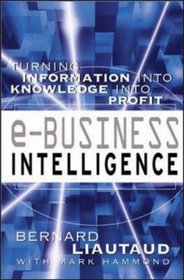Tamara K. (Daisyduke) reviewed e-Business Intelligence: Turning Information into Knowledge into Profit on + 72 more book reviews
Amazon.com
It is widely acknowledged that businesses today must harness the Net to effectively utilize the myriad details they glean from--and then pass around to--their various stakeholders. But how best to do that? e-Business Intelligence, by the head of a global company that helps others develop such efforts, lays out a variety of interrelated methodologies already in use by pioneering corporations around the world. In doing so, author Bernard Liautaud explains how to move from data (the extensive raw stats to which most contemporary firms are privy) to information (the proper context in which they must be applied) to intelligence (the collective knowledge from which appropriate actions are initiated). Liautaud shows how companies like Eli Lilly, MasterCard, and British Airways have created electronic relationships among employees, suppliers, consumers, and business partners to boost marketing, customer service, quality control, purchasing, and other activities. He explains how internal "information democracies" allow them to instantaneously distribute pertinent details throughout their organizations, while external "information embassies" facilitate the rapid transfer of pertinent facts to outside constituencies. To help readers develop their own individualized strategies, he presents specifics on gathering "customer intelligence," sharing product information, optimizing supply chains, and performing other critical tasks. --Howard Rothman
It is widely acknowledged that businesses today must harness the Net to effectively utilize the myriad details they glean from--and then pass around to--their various stakeholders. But how best to do that? e-Business Intelligence, by the head of a global company that helps others develop such efforts, lays out a variety of interrelated methodologies already in use by pioneering corporations around the world. In doing so, author Bernard Liautaud explains how to move from data (the extensive raw stats to which most contemporary firms are privy) to information (the proper context in which they must be applied) to intelligence (the collective knowledge from which appropriate actions are initiated). Liautaud shows how companies like Eli Lilly, MasterCard, and British Airways have created electronic relationships among employees, suppliers, consumers, and business partners to boost marketing, customer service, quality control, purchasing, and other activities. He explains how internal "information democracies" allow them to instantaneously distribute pertinent details throughout their organizations, while external "information embassies" facilitate the rapid transfer of pertinent facts to outside constituencies. To help readers develop their own individualized strategies, he presents specifics on gathering "customer intelligence," sharing product information, optimizing supply chains, and performing other critical tasks. --Howard Rothman




